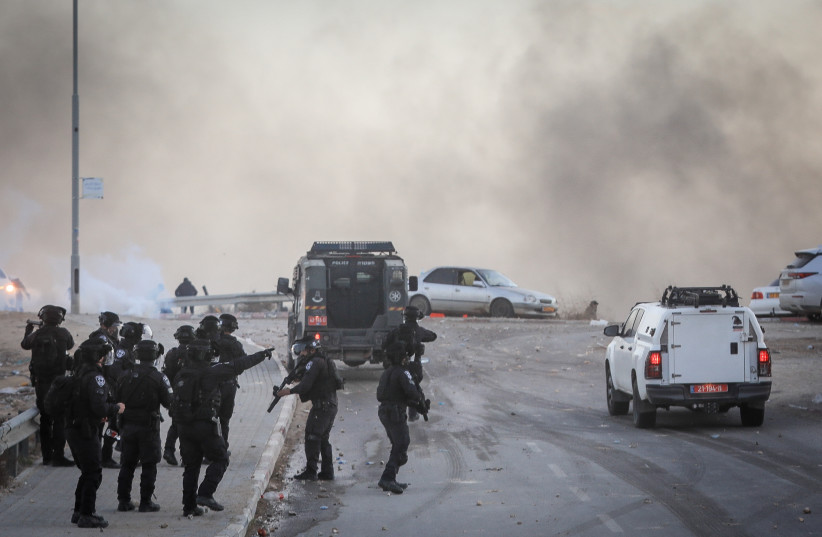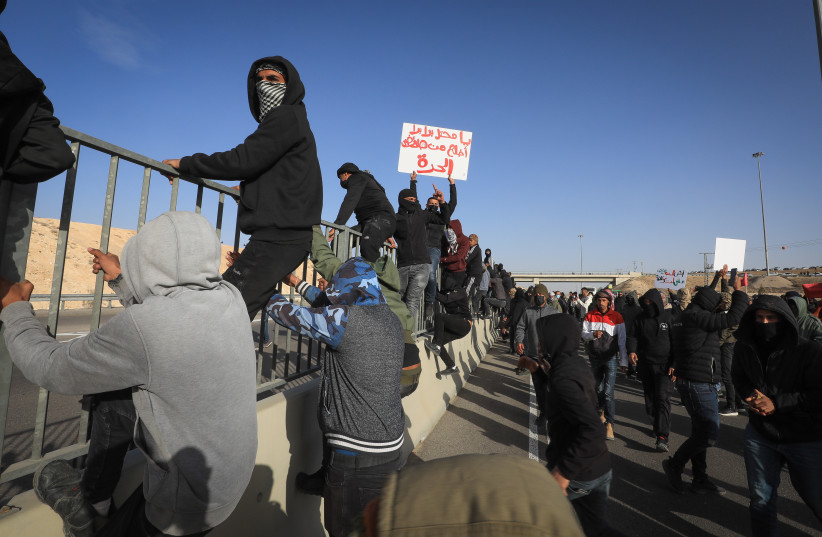by Jerusalem Post
A former head of the IDF Operations Division warned that Israel will lose the Negev unless it acts strongly.
Israeli police officers clash with Bedouins during a protest
against tree planting by the Jewish National Fund, outside the Bedouin
village of al-Atrash in the Negev desert, southern Israel, January 13,
2022.
(photo credit: JAMAL AWAD/FLASH90)
About 2,000 people, residents of Bedouin villages, demonstrated for long hours
on Thursday against tree planting by Keren Kayemeth LeIsrael-Jewish
National Fund (KKL-JNF) in the Negev. According to reports, a policeman
was injured by a stone thrown at him and two demonstrators were
evacuated to Soroka Medical Center in moderate condition, along with the
blocking of the roads to Arad and Dimona and stone-throwing against
vehicles traveling on these roads.
Maj.
Gen. (Res.) Israel Ziv, former head of the IDF Operations Directorate,
addressed the situation in the south of the country on Friday morning.
In a conversation with Nissim Mash'al on 103FM, he stated: "This brings
me back to the pictures of the beginning of the First Intifada. The
State of Israel should not take the matter lightly. If we continue like
this, we will lose the Negev in another year or two."
Ziv
expanded on his remarks: "We are seeing a kind of uprising which is
being ramped up by politicians. There could be a popular uprising here. A
situation in which the young people who took on nationalist
responsibility and came out against the IDF, while the Palestinian
leadership did not know about it at all, and it either prepared or
joined or rode on this wave only later."
"Unfortunately,
we have a similar situation in the Bedouin sector," said Ziv. "There is
a group of young people here, some with children or are husbands of
women brought from Gaza or the southern Hebron Mountains. There is a
phenomenon of accelerated Islamization among this society. In all recent
years, while the State of Israel ignored them, they have built a kind
of autonomy."
"They
live in an independent system of economy and conduct, some also do not
know Hebrew and do not go to school. We are seeing a kind of uprising,
of course it is also heated up by politicians who want to earn their
points from it." Ziv warned that "there could be a real popular uprising
here, perhaps not on the scale of Judea and Samaria but on a scale that
would not allow the way of life of the residents of the Negev."
 Israeli police officers clash with Bedouins during a protest against
tree planting by the Jewish National Fund, outside the Bedouin village
of al-Atrash in the Negev desert, southern Israel, January 13, 2022.
(credit: JAMAL AWAD/FLASH90)
Israeli police officers clash with Bedouins during a protest against
tree planting by the Jewish National Fund, outside the Bedouin village
of al-Atrash in the Negev desert, southern Israel, January 13, 2022.
(credit: JAMAL AWAD/FLASH90)In
response, Mash'al asked him if his statement was not too serious. Ziv
replied in the negative: "Unfortunately not. Perhaps technically or
officially we are still there, but in practice for almost 20 years there
has been no new settlement in the Negev. Unfortunately, I stand behind
the statement that Israel has abandoned the Negev."
Asked
if the dispute is really over land, Ziv replied: “The land is
unequivocally not in terms of a legal dispute over land ownership. There
is also a traditional perception of the Bedouin to hold on to the Negev
and they consider themselves the owners, and there is also the nationalist interest.
When the two things come together, we see the result we are seeing now.
This is not really about them taking from some farmer the land on which
he grows his wheat. There's a much heavier story here than this. Look
what's going on there, I do not believe there is even one business there
that does not pay protection to the Bedouin. Is this sovereignty? Is
this a situation where there is law and order? The one who controls
there is the one who uses force."
When
asked what he thinks should be the solution to the problem, Ziv said
that "the State of Israel should not take the matter lightly but put
this issue at the top of its priorities. This is much more important
than the Omicron. The coronavirus will pass in another year or two, but
if we continue like this we will lose the Negev. We need to occupy it in
quotation marks, not with tanks, but with a very strong presence of
security forces. It needs to be re-occupied economically, including
infrastructure, the establishment of settlements - everything. We need
to set up a special cabinet that will deal 100 percent with this
matter."
He
later referred to the deaths of IDF officers in the training accident
of the Egoz unit, when he said that what led to the wrongful shooting
was a routine of stealing weapons from the bases. "I learned from the
reports and conversations with the IDF that the problem there really
stems from both the circumstances and an essential problem of an
initiative, which is at its base positive, but is not coordinated
between the soldiers and the framework," he explained.
"This
is what brought about these dire circumstances. It must be said that
the situation is such that because equipment had been stolen from them
the day before and they were anxious that more weapons would be stolen
from them, the officers took the initiative which stemmed from a great
deal of responsibility. At the end of a training day, they took
themselves and went to scan the area to see that God forbid there were
no weapons left there. They showed great responsibility," he explained.
Jerusalem Post
Source: https://www.jpost.com/israel-news/article-692567

No comments:
Post a Comment